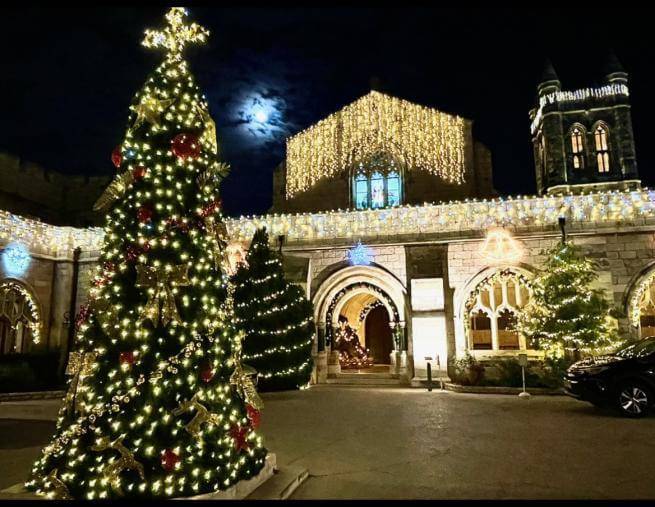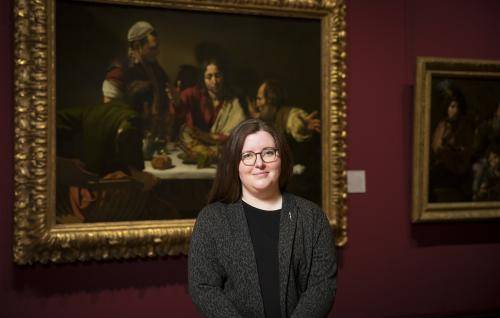Advent Reflections from Jerusalem
Advent Reflections from Jerusalem
Richard Sewell, Dean of St George's College in Jerusalem, reflects on Advent in the Holy Land.
1. Christmas in Jerusalem

The Cathedral Church of St George, Jerusalem, Christmas 2022.
Christmas lights will go up in churches and schools before, or in time for, the start of Advent in the Holy Land. I know the debate about the ‘right time to put up Christmas decorations’ plays out every year and when I lived in England, I was always one of those wanting a later appearance of all the twinkles and sparkles. But things are different in the Holy Land in so many ways.
When I say ‘Holy Land’, I mean Israel and Palestine and by Palestine, I mean the West Bank, East Jerusalem and Gaza. Tragically, with the war between Israel and Hamas raging for the past weeks, everyone knows the Middle East map better.
I moved to East Jerusalem over five years ago and in that time, I have learned very many things. One is how very important the seasons of Advent and Christmas are to Christians in these lands. We account for less than 2% of the population, and the vast majority of us are Palestinians, not Westerners like me.
This time of year is the time when Christians can become visible amongst either a Jewish or Muslim majority; it’s our time to shine, to be noticed and to proclaim that Jesus Christ is a light in the darkness for all the world. It’s a chance we cannot miss, so the lights go up early here.
This year the darkness is almost overwhelming because of the appalling suffering caused by the war. People in the UK are also aware of the pervasive evil and violence because it’s all over your news too.
Christians in the Holy Land will find it hard to celebrate with any joy at all. But we will put up the Christmas lights and decorations, though they be will be muted. The churches here have already declared that we will forego ‘unnecessarily festive activities…and focus more on the spiritual meaning of Christmas’. Christians will do whatever is possible in Gaza, but Christmas won’t be cancelled in the rest of these Lands. We need the light of Christ at Christmas, everyone needs it, more than ever.
2. A Season of Hope?

Advent is a season of hope. Today it seems to be in short supply in the Holy Land, but being the birthplace of Christian hope, Christians here are not about to give up on hope.
However, we must distinguish between Christian hope and optimism. After the brief truce in Gaza came to an end, it is hard to be optimistic about the prospects for peace. But Christian hope is rooted in the oracles of the Old Testament prophets who reflected on the suffering of the people of Judah during their exile in Babylon. From refugee suffering came the idea of a Messiah who would save the people and lead them into a place of restoration, renewal and reconciliation. Christians believe the birth of Jesus in Bethlehem centuries later fulfilled that hope.
The Judean and Jordanian deserts are located between Babylon (in modern day Iraq) and Jerusalem. Eventually the Israelites’ suffering in their distant exile came to an end and they returned to Jerusalem and rebuilt the city and the kingdom.
The desert is still today only a few miles from Jerusalem and Bethlehem. It is a part of the landscape of the lives of Christians, Muslims and Jews who live in the Land. We respect the desert but we do not fear it. The desert is where the softly spoken words of God are heard. Jesus went there after his baptism, not to suffer deprivation, but to understand God’s calling upon him.
This year, more than before, Advent will have something of the desert about it for us living in the Holy Land. But we are not the only ones who suffer. Anyone grieving, desperately lonely or lost in their life will identify with that desert experience. Yet, in the desert, God makes ‘a way in the wilderness and rivers in the desert’ (Is 43:20). Advent hope, unlike optimism, does not promise that everything is getting better, but promises that God is with us. Do not ask us to be optimistic, but we are staying hopeful.
3. Advent of Peace?

The fourteen pointed star which marks the traditional place of Jesus's birth.
Peace is that most ephemeral of inner human qualities and also the most elusive of features in our world.
We desire an inner peace that will help us to face the challenges and frustrations of our lives and we yearn for peace in the world that will drive away suffering, divisions and warfare. The Roman Empire claimed to have established ‘Pax Romana’ because Caesar Augustus inaugurated a period when no great wars raged within the realm. Jesus was born in this so-called period of Roman peace. While it may have been peaceful for some, it was tyranny for others. Jesus was born under Roman occupation and it was experienced by his people, the Jews of Judea and Galilee, as oppression.
Palestinians today feel that they are living under a system of occupation and the long ‘Wall of Separation’ which divides Israel from the West Bank and Gaza is a visible symbol of the occupation and of divided peoples. On Christmas Eve, Christians who live in Jerusalem, including our own Anglican congregation have to traverse the Wall and the checkpoint to make the seven mile journey to Bethlehem.
We go there for a special service in the Basilica of Nativity at the traditional location of Jesus’s birth, to celebrate the birth of the Son of God, another of whose titles is the ‘Prince of Peace’. That name was appropriate then as it is now: Jesus comes into a world wracked with violence and suffering and which cries out for peace. That is not simply peace as the absence of war, but the peace which penetrates deep and wide to create justice for all. This Christmas, more than almost any before, we are conscious that the Holy Land is in a state of utter turmoil, when the yearning for an end to war and for the establishment of real peace is visceral.
Jesus Christ was born to be the source of that peace, for the world and for us as individuals. Whatever our own inner turmoil or distress, whatever deeply troubles us, Jesus, as the presence of God among us, can be the source of our inner peace too. It is a peace which brings calm to the unrest within us and it is the peace which breaches the bitterest of divides in the world. This is a wondrous gift to us all, but it is also a gift we must be ready to receive and to share in our lives and in our world, starting from Bethlehem and spreading from there, to everywhere.
4. A Season of Light?

From the Mount of Olives, the sun rising over the Jordan Valley.
I have never had to endure such a dark time. I am sure many readers will feel the same. My parents talked about living through the Second World War and that must have been hell, especially during the Blitz which affected my family because heavily-bombed Plymouth was their home. But to live in the Holy Land at a time when it is enveloped in the darkness of deeds and words of hatred, brutal violence, deaths of children, women and men on a terrifying scale every day, is far beyond any previous experience for me. This feels like the darkest hour. There is no question that it must feel the same for almost every Muslim, Christian and Jew living in Gaza, the West Bank and Israel.
When we read the Gospel accounts of the birth narratives, if we can shake off their cosy familiarity for a moment, we can see that those were dark times too. The Roman occupation was terrifyingly brutal and their client King, Herod the Great, was a tyrant of the highest order. Mary and Joseph had their own personal trauma of a child born out of wedlock and an arduous ninety-mile trek whilst heavily pregnant. Yet, from these desperate and unpromising circumstances, a glorious light came into the world: “the dawn from on high will break upon us, to give light to those who sit in darkness and in the shadow of death, to guide our feet into the way of peace.” (Luke 1:78-79).
Christmas here is celebrated on different dates: for the Orthodox churches it is January 7. Catholics and Anglicans/Protestants are united in holding to December 25. On both Christmas Eve dates, Palestinian Christians (with some pilgrims and tourists), gather in huge numbers in Manger Square in Bethlehem hoping to be granted entry to the Nativity Churches. This year, Christians will endeavour to do the same, despite the fearful times, as an act of faith, as an act of defiance in the face of the sadness we feel within and the darkness we see abroad. This may appear as a faint light on the horizon, but that will be sufficient on which our hope can be founded.








